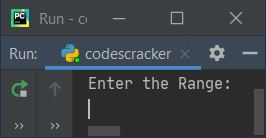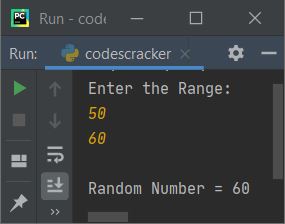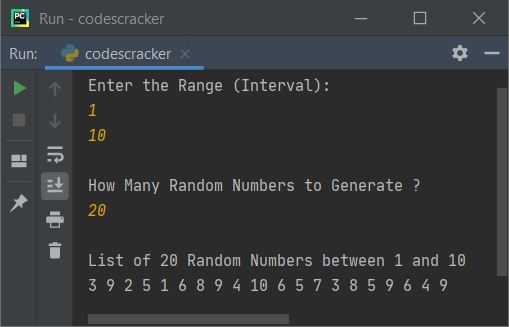- Python Basic Programs
- Python Program Examples
- Python Print Hello World
- Python Get Input from User
- Python Add Two Numbers
- Add Subtract Multiply Divide
- Python Check Even or Odd
- Python Check Prime or Not
- Python Check Alphabet or Not
- Python Check Vowel or Not
- Python Check Leap Year or Not
- Check Reverse equal Original
- Check Positive Negative Zero
- Python Check Armstrong or Not
- Python Check Palindrome or Not
- Python Check Perfect Number
- Python Find Reverse of Number
- Python Count Digits in Number
- Python Add Digits of Number
- Sum of First and Last Digits
- Python Product of Mid Digits
- Sum of Squares of Digits
- Interchange Digits of Number
- Python Sum of n Numbers
- Python Print ASCII Values
- Python Swap Two Numbers
- Python Swap Two Variables
- Python Fahrenheit to Celsius
- Python Celsius to Fahrenheit
- Python Display Calendar
- Python Days into Years, Weeks
- Find Largest of Two Number
- Find Largest of Three Number
- Python Print Fibonacci Series
- Generate Armstrong Numbers
- Python Make Simple Calculator
- Python Add Binary Numbers
- Binary Number Multiplication
- Python Mathematical Programs
- Find Sum of Natural Numbers
- Find Average of n Numbers
- Python Print Multiplication Table
- Print Table using Recursion
- Python Find Average Percentage
- Python Find Grade of Student
- Find Square Root of Number
- Python Print Prime Numbers
- Find Numbers Divisible by
- Python Find Factors of Number
- Python Find Factorial of a Number
- Python Find HCF & LCM
- Python Kilometres to Miles
- Python Find Area of Square
- Python Find Area of Rectangle
- Python Find Area of Triangle
- Python Find Area of Circle
- Python Find Perimeter of Square
- Find Perimeter of Rectangle
- Python Find Perimeter of Triangle
- Find Circumference of Circle
- Python Simple Interest
- Python Solve Quadratic Equation
- Python Different Set of Operations
- Python Display Powers of 2
- Python Find nCr & nPr
- Python Pattern Programs
- Python Print Pattern Programs
- Python Print Diamond Pattern
- Python Print Floyd's Triangle
- Python Print Pascal's Triangle
- Python List Programs
- Python Count Even/Odd in List
- Python Positive/Negative in List
- Python Even Numbers in List
- Python Odd Numbers in List
- Python Sum of Elements in List
- Sum of Odd/Even Numbers
- Python Element at Even Position
- Python Element at Odd Position
- Python Search Element in List
- Python Largest Number in List
- Python Smallest Number in List
- Python Second Largest in List
- Python Second Smallest in List
- Python Insert Element in List
- Python Delete Element from List
- Python Multiply Numbers in List
- Swap Two Elements in List
- Python 1D Array Program
- Python Linear Search
- Python Binary Search
- Python Insertion Sort
- Python Bubble Sort
- Python Selection Sort
- Remove Duplicates from List
- Python Reverse a List
- Python Merge Two List
- Python Copy a List
- Python Conversion Programs
- Python Decimal to Binary
- Python Decimal to Octal
- Python Decimal to Hexadecimal
- Python Binary to Decimal
- Python Binary to Octal
- Python Binary to Hexadecimal
- Python Octal to Decimal
- Python Octal to Binary
- Python Octal to Hexadecimal
- Python Hexadecimal to Decimal
- Python Hexadecimal to Binary
- Python Hexadecimal to Octal
- Python Matrix Programs
- Python Add Two Matrices
- Python Subtract Two Matrices
- Python Transpose Matrix
- Python Multiply Matrices
- Python String Programs
- Python Print String
- Python Find Length of String
- Python Compare Two Strings
- Python Copy String
- Python Concatenate String
- Python Reverse a String
- Python Swap Two Strings
- Python Uppercase to Lowercase
- Python Lowercase to Uppercase
- Python Check Substring in String
- Python Count Character in String
- Count Repeated Characters
- Python Count Word in Sentence
- Python Count Each Vowels
- Python Capitalize Character
- Python Capitalize Word in String
- Python Smallest/Largest Word
- Remove Spaces from String
- Remove Duplicate Character
- Remove Vowels from String
- Remove Punctuation from String
- Python Remove Word in String
- Python Remove Duplicate Words
- WhiteSpace to Hyphens
- Replace Vowels with Character
- Replace Character in String
- Python Sort String in Alphabetical
- Sort Word in Alphabetical Order
- Extract Number from String
- Python Check Anagram Strings
- Python File Programs
- Python Read a File
- Python Write to File
- Python Append Text to File
- Python Copy Files
- Python Merge Two Files
- Python Counts Characters in File
- Python Count Words in File
- Python File Content in Reverse
- Python Lines Contains String
- Python Delete Line from File
- Python Capitalize Word in File
- Python Replace Text in File
- Replace Specific Line in File
- Python Find Size of File
- Python List Files in Directory
- Python Delete Files
- Python Misc Programs
- Python Reverse a Tuple
- Python Merge Two Dictionary
- Python bytes to String
- Python bytearray to String
- Generate Random Numbers
- Python Print Address of Variable
- Python Print Date and Time
- Python Get IP Address
- Python Shutdown/Restart PC
- Python Tutorial
- Python Tutorial
Python Program to Generate Random Numbers
This article is created to cover some programs in Python, that generate and prints random numbers. Here are the list of programs on generating random numbers in Python:
- Generate a single random number
- Generate a random number in given range
- Generate multiple random numbers in given range
Generate a Random Number
This program generate and prints a single random number using random.random(). The function random() is defined in random module, therefore we've to import the module before calling the function, like shown in the program given below:
import random randnum = random.random() print("Random Number =", randnum)
Here is its sample output:

Generate a Random Number in Given Range
This program also does the same job of generating random number, but in a given range. The range must be provided by user at run-time. For example, if user enters range as 10 and 40, then random number generated will be greater than or equal to 10 and less than or equal to 40.
import random print("Enter the Range: ") start = int(input()) end = int(input()) randnum = random.randint(start, end) print("\nRandom Number =", randnum)
Here is its sample run:

Now supply the input say 50 and 60 as range to generate a random number lies between these two numbers like shown in the snapshot given below:

Modified Version of Previous Program
This program uses try-except to handle with invalid inputs. Rest of the things are similar to previous program.
import random print("Enter the Range: ") try: start = int(input()) try: end = int(input()) randnum = random.randint(start, end) print("\nRandom Number =", randnum) except ValueError: print("\nInvalid Input!") except ValueError: print("\nInvalid Input!")
This program produces same output as of previous program.
Generate Multiple Random Numbers in Given Range
To generate multiple random numbers in given range in Python, you have to ask from user to enter the range, then ask to enter the value of n to print n random numbers in given range, like shown in the program given below:
The question is, write a Python program to generate and print n random numbers in given range. Here is its answer:
import random print("Enter the Range (Interval): ") a = int(input()) b = int(input()) if a>b: t = a a = b b = t print("\nHow Many Random Numbers to Generate ? ") tot = int(input()) randnums = [] for i in range(tot): randnums.append(random.randint(a, b)) print("\nList of " +str(tot)+ " Random Numbers between " +str(a)+ " and " +str(b)) for i in range(tot): print(randnums[i], end=" ") print()
Here is its sample run with user input 1 and 10 as range, and 20 as size to generate twenty random numbers between 1 and 10 like shown in the snapshot given below:

The statement (from above program) randnums = [] defines a empty list. The following code:
for i in range(tot):
is applied to execute the following statement:
randnums.append(random.randint(a, b))
tot number of times. The append() method appends or adds an element at the end of list randnums. for example, if tot=10, then 10 random numbers gets appended to the list named randnums one by one
The str() method is used to convert from int to string type, so that, using +, all the strings inside print() gets concatenated and printed at once, on output screen.
Same Program in Other Languages
« Previous Program Next Program »